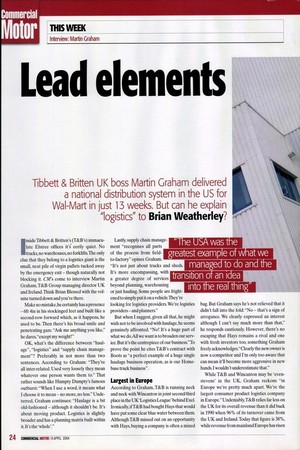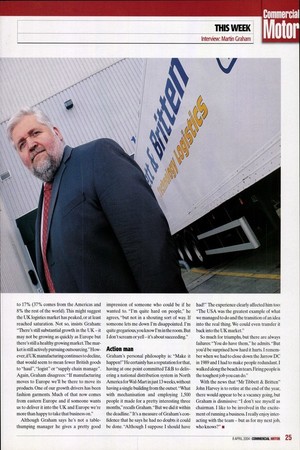Lead elements
Page 24

Page 25

If you've noticed an error in this article please click here to report it so we can fix it.
Tibbett & Britten UK boss Martin Graham delivered a national distribution system in the US for Wal-Mart in just 13 weeks. But can he explain
"logistics" to Brian Weatherley? Inside Tibbett & Britten's (T&B's) immaculate Elstree offices it'd eerily quiet. No trucks, no warehouses, no forklifts.The only clue that they belong to a logistics giant is the small, neat pile of virgin pallets tucked away by the emergency exit — though naturally not blocking it. CM's come to interview Martin Graham, T&B Group managing director UK
• and Ireland. Think Brian Blessed with the volume turned down and you're there.
Make no mistake,he certainly has a presence — 6ft 4in in his stockinged feet and built like a second-row forward which, as it happens, he used to be. Then there's his broad smile and penetrating gaze. "Ask me anything you like," he dares, "except my weight!"
OK, what's the difference between "haulage", "logistics" and "supply chain management"? Preferably in not more than two sentences. According to Graham: "They're all inter-related. Used very loosely they mean whatever one person wants them to." That rather sounds like Humpty Dumpty's famous outburst: "When I use a word, it means what I choose it to mean — no more, no less." Undeterred, Graham continues: "Haulage is a bit old-fashioned — although it shouldn't be. It's about moving product. Logistics is slightly broader and has a planning matrix built within it. It's the 'whole'." Lastly, supply chain management "recognises all parts
of the process from fieldto-factory" opines Graham.
"It's not just about trucks and sheds. It's more encompassing, with a greater degree of services beyond planning, warehousing or just hauling. Some people are fright
ened to simply put it on a vehicle.They're looking for logistics providers. We're logistics providers — and planners."
But when I suggest, given all that, he might wish not to be involved with haulage, he seems genuinely affronted. "No! It's a huge part of what we do.All we want is to broaden our service. But it's the centrepiece of our business." To prove the point he cites T&B's contract with Boots as "a perfect example of a huge single haulage business operation, as is our Homebase truck business". Largest in Europe According to Graham, T&B is running neck and neck with Wincanton in joint second/third place in the UK 'Logistics League' behind Exel. Ironically, if T&B had bought Hays that would have put some clear blue water between them. Although T&B missed out on an opportunity with Hays, buying a company is often a mixed
bag. But Graham says he's not relieved that it didn't fall into the fold: "No — that's a sign of arrogance. We clearly expressed an interest although I can't say much more than that," he responds cautiously. However, there's no escaping that Hays remains a rival and one with fresh investors too, something Graham freely acknowledges."Clearly the new owner is now a competitor and I'm only too aware that can mean it'll become more aggressive in new hands. I wouldn't underestimate that." While T&B and Wincanton may be 'evenstevens' in the UK, Graham reckons "in Europe we're pretty much apart. We're the largest consumer product logistics company in Europe." Undeniably,T&B relies far less on the UK for its overall revenue than it did back in 1990 when 96% of its turnover came from the UK and Ireland. Today that figure is 38%, while revenue from mainland Europe has risen
to 17% (37% comes from the Americas and 8% the rest of the world). This might suggest the UK logistics market has peaked, or at least reached saturation. Not so, insists Graham: "There's still substantial growth in the UK — it may not be growing as quickly as Europe but there's still a healthy growing market.The market is still actively pursuing outsourcing." However, if UK manufacturing continues to decline, that would seem to mean fewer British goods to "haul", "logist" or "supply chain manage". Again, Graham disagrees: "If manufacturing moves to Europe we'll be there to move its products. One of our growth drivers has been fashion garments. Much of that now comes from eastern Europe and if someone wants us to deliver it into the UK and Europe we're more than happy to take that business on." Although Graham says he's not a tablethumping manager he gives a pretty good
impression of someone who could be if he wanted to. "I'm quite hard on people," he agrees, "but not in a shouting sort of way. If someone lets me down I'm disappointed. I'm quite gregarious,you know I'm in the room. But I don't scream or yell — it's about succeeding." Action man Graham's personal philosophy is: "Make it happen!" He certainly has a reputation for that, having at one point committed T&B to delivering a national distribution system in North America forWal-Mart in just 13 weeks, without having a single building from the outset. "What with mechanisation and employing 1,500 people it made for a pretty interesting three months," recalls Graham. "But we did it within the deadline." It's a measure of Graham's confidence that he says he had no doubts it could be done. "Although I suppose I should have
had!" The experience clearly affected him too: "The USA was the greatest example of what we managed to do and the transition of an idea into the real thing. We could even transfer it back into the UK market."
So much for triumphs, but there are always failures: "You do have them," he admits. "But you'd be surprised how hard it hurts. I remember when we had to close down the Jarrow DC in 1989 and I had to make people redundant. I walked along the beach in tears. Firing people is the toughest job you can do." With the news that "Mr Tibbett & Britten" John Harvey is to retire at the end of the year, there would appear to be a vacancy going, but Graham is dismissive: "I don't see myself as chairman. I like to be involved in the excitement of running a business. I really enjoy interacting with the team — but as for my next job, who knows?" •






































































































